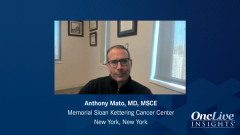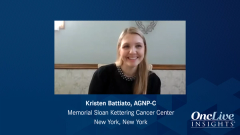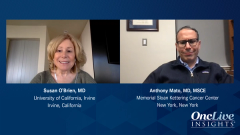
Individualizing Therapy for Patients With Newly Diagnosed CLL
Susan O’Brien, MD, and Anthony Mato, MD, MSCE, describe their preferences for treating newly diagnosed chronic lymphocytic leukemia based on disease presentation and patient variables.
Episodes in this series

Susan O’Brien, MD: What about if this patient were, we already said, if you didn’t have a 17p, I said would you add antibody? Let me back up again and say if this patient didn’t have a 17p would you still use acalabrutinib or what would be your treatment of choice?
Anthony Mato, MD, MSCE: Then I think everything’s on the table and is an equal choice for patients. Unfortunately, we don’t have head-to-head data for any BTK [Bruton tyrosine kinase] inhibitor vs venetoclax. So I think it’s a conversation of risk-benefit, how the regimen itself will impact the lifestyle of the patient, can they make the commitment for an escalation, so on and so forth. I’m pretty comfortable, no matter what you chose in that situation, be it ibrutinib, acalabrutinib, or venetoclax, you’re going to have an excellent outcome for patients generally. So I don’t think that there is a right answer. There are several right answers.
Susan O’Brien, MD: Does the mutation status influence you at all in the non-17p?
Anthony Mato, MD, MSCE: I feel like people are talking about that a little bit more where the BTK inhibitors seem to have similar outcomes when stratified by IGHV [immunoglobulin heavy chain] status, but the venetoclax-based curves from the CLL14 [trial] are separate, favoring the mutated patients. To me, I’m not really ready yet to make a decision for 1 targeted therapy or the other over based on IGHV status alone. But I think the right answer is probably we should be doing trials that are separate and different in those populations to try to discern that a little bit more.
Susan O’Brien, MD: I agree with you. As you said, in the venetoclax/obinutuzumab trial, the unmutated are not fairing quite as well as the mutated, but the mutated are doing fabulously. So unmutated are still doing well, I think we have reached a median PFS [progression-free survival] in that group, and it’s about 5 years. But don’t forget, that’s 4 years off therapy so that’s still a very attractive end point. Then there’s also the presumption, and I think there is data emerging to support this, that if you have stopped therapy and you have a long remission, you may be able to usethat therapy again. Which is also very attractive. I’m totally with you on that. I think the unmutated non-17p are going to have a great outcome no matter what you do. It’s hard to decide just based on the mutation status.
Let’s recast this patient with no 17p but 85 [years old]. What do you do in that setting? In other words, an older patient, let’s say he has your usual comorbidities at that age, maybe some hypertension, some hyperlipidemia. The case we have was quite young and we didn’t hear about any significant comorbidities, which is certainly possible in a 61-year-old. You may not have had any but let’s cast this patient as an older patient with standard comorbidities. Does that impact your choice of therapy?
Anthony Mato, MD, MSCE: A little bit. I feel that at least the data I have comparing the ECOG 1912 vs the ALLIANCE data set for ibrutinib suggests that the toxicities increase significantly with ibrutinib-based therapy for older patients and so I’m more likely to eliminate ibrutinib for somebody who might have underlying hypertension or some other cardiovascular risk factor and advanced age. In a world where I have a choice between ibrutinib and acalabrutinib, extrapolating data from the randomized ELEVATE-RR trial where those toxicities seem to be less for patients who are getting acalabrutinib-based therapy, I have no problem giving acalabrutinib. I have no problem giving venetoclax to an older patient, keeping in mind, you may not get to a stable dose of 400 mg before you start to get some cytopenia. I think BTK inhibitors and venetoclax are still on the table even in advanced patients in terms of age.
Transcript edited for clarity.



































